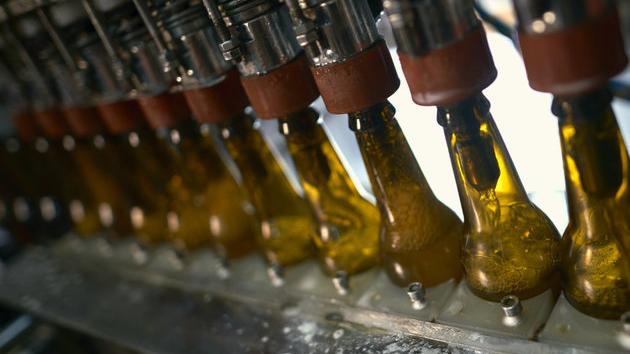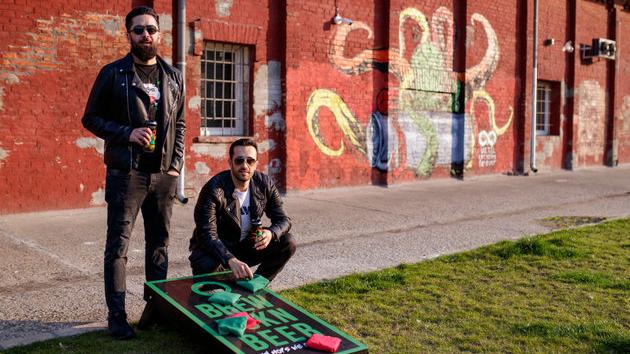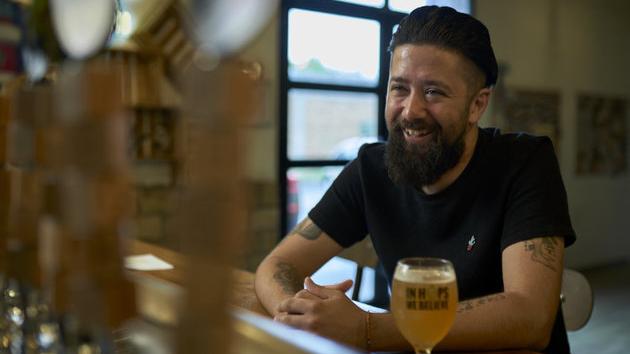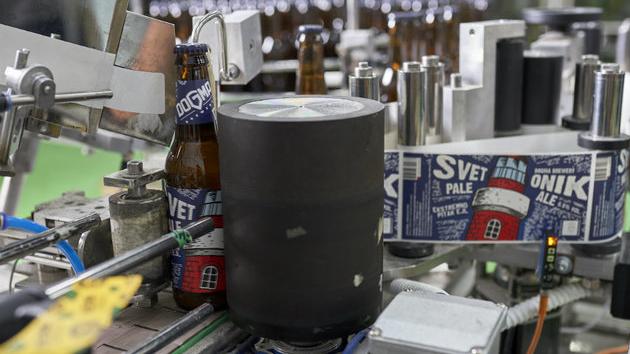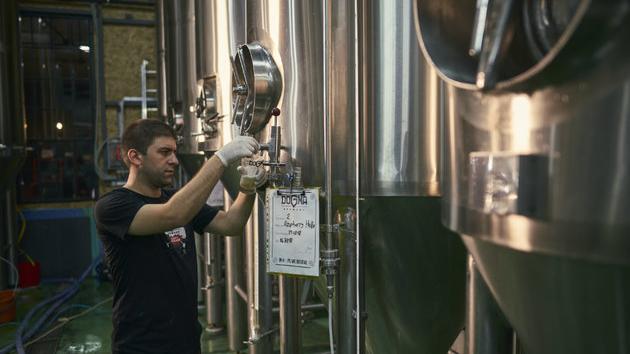Craft beers from Dogma enjoyed by fans worldwide – Take a look at the unique Tap Room in old Sugar Plant's hangar
Source: eKapija
 Tuesday, 09.07.2019.
Tuesday, 09.07.2019.
 12:22
12:22
 Tuesday, 09.07.2019.
Tuesday, 09.07.2019.
 12:22
12:22
(Photo: Dogma Brewery arhiva)

The Dogma brewery is soon to celebrate its third anniversary and truly has something to show for itself. At the time when craft beermaking in Serbia is undergoing a real boom, it's important to retain its character, which Dogma has definitely managed to do.
The unique environment of the so-called Dogma Tap Room in the hangar of the old Sugar Plant, where you feel like at home, the beer which wins you over at first sip and the hosts who are always ready to recommend the right beer for every occasion, all this is available at the source itself, where you can also see how the beer is produced and how the hard-working experts of Dogma handle the best quality ingredients, creating beverages of various flavors. That they're doing a great job is confirmed by the fact that the guests always come back for another dose of Dogma.
What is the secret of this brewery's success?
The idea to open a craft brewery in Serbia was something that Vladimir Stojkovic had considered for a long time. Born in Majdanpek, Vladimir graduated from high school in Negotin, where he studied to be a food technician. He later graduated from the Faculty of Agriculture in Belgrade as a food technologist.
– I fell in love with Belgrade at first sight and I believe I've been here for 20 years now. Although I specialized in beer, my first job was at a distillery. I believed that rakija was the drink that could create the boom that we now see craft beer is making. Despite this episode, I kept thinking about traditional craft beermaking and I founded Miners Pub with my friends in 2014. That year was a turning point for craft beermaking in Serbia – Vladimir says for our portal.
Vladimir used to make home beer back then, testing different recipes, traveling a lot, visiting craft breweries worldwide, meeting people and making new friends.
– In a way, they are all a part of the history of Dogma and they've helped me a lot, both through their advice and through their contacts.
In 2014, it was not easy to find an investor and convince them to invest in a craft brewery. The crucial event for Dogma was Vladimir's meeting with his childhood friend, his current business partner. After a couple of conversations, they decided to open a brewery.
– I know it sounds like a cliché, but when you really believe in something, when you repeat it as a mantra each day, everything comes into place sooner or later. When the time came for us to open a brewery, I was ready. I had worked on the project for a long time, I had already had a business plan and a good basis, I had drafts of equipment and producers' contacts. Although we registered the company in late 2015, the first beer in Dogma was brewed on July 20, 2016. We are soon celebrating our third anniversary and I can say that we've done a great job – our interviewee says.
Vladimir Stojkovic (Photo: Dogma Brewery arhiva)

Think global, drink local
Nearly all the equipment at Dogma was made in Serbia. As Vladimir says, that was the idea from the start, for several reasons.
– The first and the most important one is the “storytelling” aspect. You always have a good story when you're working with something local. One of the most important tags in craft beermaking is “local”: “Think global, drink local”, “Support local brewery”, “Drink local beer”... Another reason is the affordable price, much better than in the region and the rest of Europe. Of course, there's also the quick service. Although there are some pieces of equipment that come from Germany, Italy or America, the equipment made in Serbia is absolutely dominant – Stojkovic points out.
When it comes to the equipment, you can find nearly everything you need in Serbia.
– These are mostly companies which produce equipment made of inox. It is a truly wonderful material, whose inventor earned a Nobel Prize! Maybe people here can't make a fermentor like Italians do, or sell the tradition that Germans have, but they can do a perfect microbiological weld, which is very important for us as producers. A large number of companies which used to produce inox equipment for wines and dairies have now switched to craft beermaking – Vladimir says.
From the very beginning, Dogma has been recording incredible results. The initial capacity of the brewery was 16,000 liters of beer a month, and by their third anniversary, they've reached a 300% growth and the production of 48,000 liters a month.
– We have recognized our niche, made quality beer meant for hedonists from 18 to 88, who can afford the product, and there are more and more people who can and who are turning to craft beermaking. Our first product, still our best selling one, is Hoptopod IPA, which accounts for 50% of our production at the moment. This is an India Pale Ale, modeled after American west coast beers, drier and very hoppy. Although the alcohol content is 6.5%, the beer is pretty balanced and smooth, while also being very aromatic.
Beer brewing at Dogma (Photo: Dogma Brewery arhiva)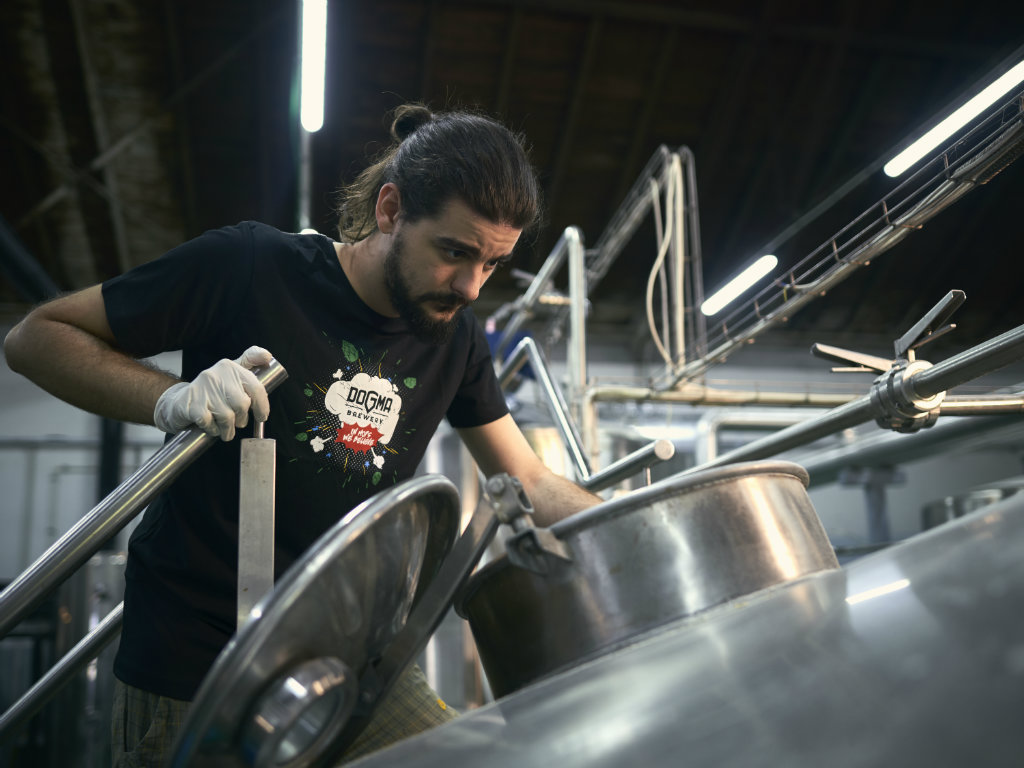

What's brewing today?
As Vladimir says, Hoptopod is available throughout the year, as are Svetionik IPA and Albino. Svetionik is a 5.5% Pale Ale, light and ideal for beginners in craft beermaking. It is smooth, carefully hopped with hops featuring aromas of mango, orange, tangerine and grapefruit. Albino is a wheat beer, kind of between the Belgian Wit and India Pale Ale. It's a style that's proven to be very good. It is produced very rarely, and it is quite hoppy and citrusy, with an orange zest and a little coriander. It's a true refreshing summer White IPA.
– In addition to these beers, which we offer throughout the year, we also make a large number of seasonal beers. When the weather is a bit colder, we brew dark beers. In summer, we choose refreshing notes, such as, for example, our Summer Ale. We also have a wheat beer with raspberry – Raspberry Hefeweizen. At foreign festivals, I always emphasize in my conversations with beer aficionados that Serbia is one of the biggest producers of raspberries in the world, which is why we use Serbian raspberries in our beer. These seasonal beers are very important. This way, we always offer something new to our guests, showing them how creative we can be – our interviewee says.
He also mentions collaborations as an important aspect of their work. As he says, in addition to presentations at festivals, this is the strongest means of presenting and selling your product.
– We're talking about two or more producers brewing at one or both breweries. Ahead of our third anniversary, we had 3 collaborations with foreign colleagues. With Hop Hooligans from Bucharest, we made the currently very popular beer style Micro IPA, with little alcohol, 3.6%, and still quite hoppy. With the Pelicon brewery from Slovenia, we make beer with mint tea, and with the Milan-based brewery Lambrate, which has existed for more than 25 years, we made Gose, a salty beer with black currant and a little gingerbread. The currant also comes from Serbia and is produced at a plantation at the foot of Rtanj. The local aspect is very important here as well – Stojkovic points out.
The ability to play with flavors is the freedom craft brewers have. The most important thing, he says, is for people to go back to the products and recognize that you know what you're doing.
– Recently, we made New Pils on the Block, inspired by the big trend in breweries worldwide where hoppy beers are put aside and traditional beer styles are being brought back. We brewed a German Pilsner and named it that because we used a new German hops variety – Mandarina Bavaria, and of course, because of the band New Kids on the Block, which some of us still remember. The beer was sold out within 10 days and we now have to prepare new rounds – Vladimir says.
Beer brewing at Dogma (Photo: Dogma Brewery arhiva)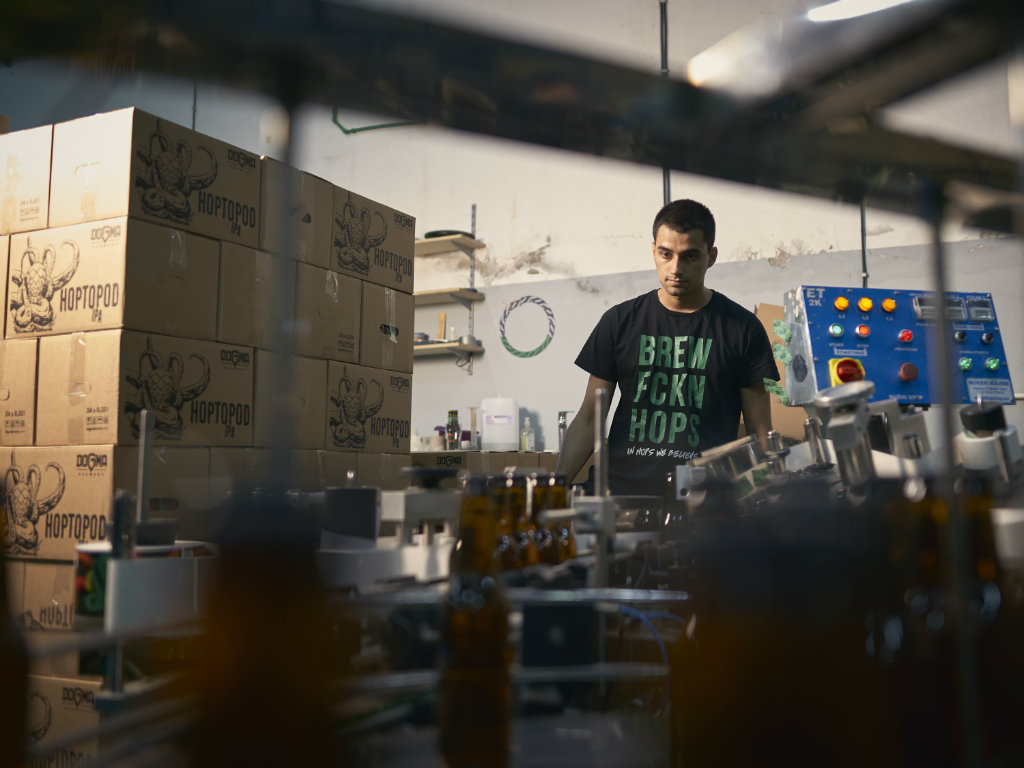

Worldwide Dogma
That Dogma is not just popular locally, but worldwide, is shown by the constant growth they've been recording and the export to as many as 23 countries of the world.
– This is something that sets us apart from other craft breweries in Serbia – we've been exporting the beer since the beginning, first to Slovenia and Croatia. Today, our exporting portfolio features 23 countries, 10 or 11 of which are states we are constantly present in, and there are also some countries where we've been present at various festivals. We are still working on expanding the market. I will soon take a trip to Istanbul, where potential distributors want to organize several tasting events for Hoptopod IPA. We will also be present at the London Craft Beer festival, where we will try to return to the English market, to which we exported 65,000 bottles for the company Beer 52 in 2018. They have a specific concept where they only sell online. Our idea is to be constantly present in Great Britain. We will attend three events within the Berlin Beer Week in late July – Stojkovic says.
The former Yugoslav countries, Bulgaria, France and Italy are just some of the markets where you can find the Dogma beer.
– There's also Switzerland, we have recently opened the markets of Denmark and Germany, we want to return to Belgium, and we are also fighting for the market of Austria. We've had presentations at two festivals in Vienna and the reactions were great, but we don't have distributors yet. Recently, we sent samples to Shenzhen and Los Angeles. The reactions have been great, and if we manage to penetrate the markets of China and the USA, it will truly be a great thing for us – our interviewee says.
As he says, apps which allow users to rate beers are very useful.
– According to the ratings at RateBeer.com, we were the best Serbian craft brewery in 2018. We are also well rated at the Untappd app, and Dogma Tap Room is also rated as a hospitality facility at Trip Advisor. You are either rated or not at these apps, it's all transparent and we can see how people react to our product. It helps us a lot, both in communicating with out clients and in cooperating with the current and the potential distributors. Thanks to these apps, there are more and more foreign tourists at Dogma, so, through this location, which has the potential of becoming a new urban quarter, such as those in Berlin and other major cities of the world, we present a positive image of Belgrade and Serbia.
Vladimir Stojkovic and Mladjen Merdovic, founders of Dogma (Photo: Dogma Brewery arhiva)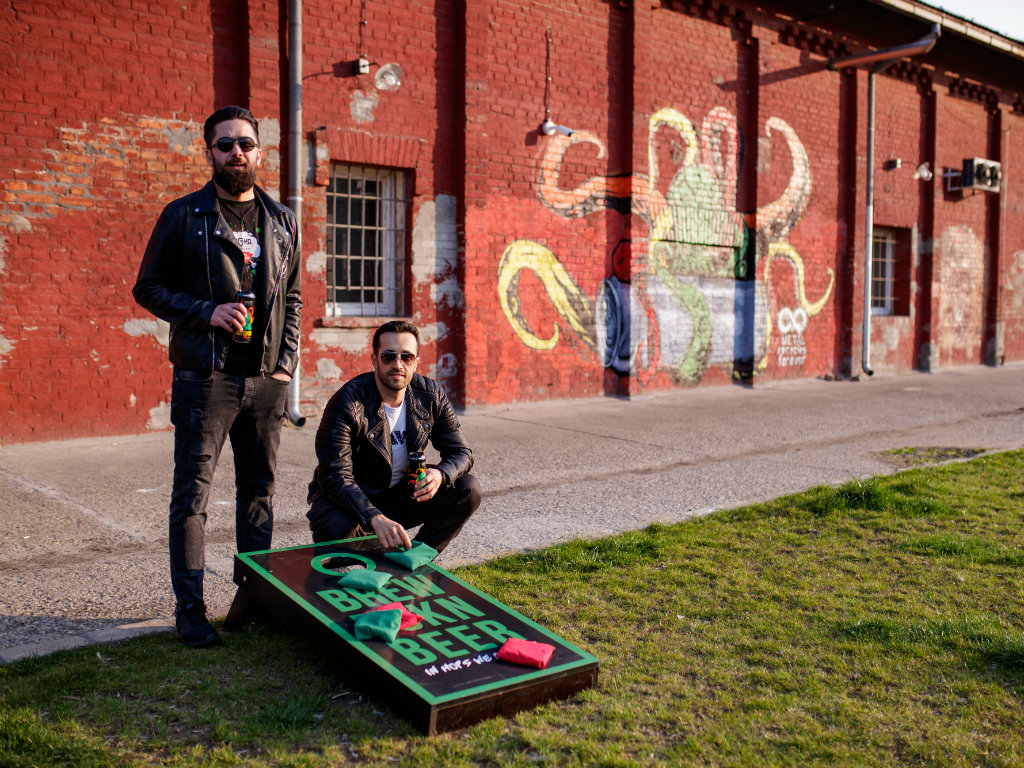

Quality and knowledge – winning combination
Another thing that makes Dogma stand out among other craft breweries is its professional staff. Of the six production employees, five are food technology engineers. As Vladimir says, it is one of the most important things in making any product, including quality craft beer.
– Large industrial breweries often claim in their ads that the most important thing for a good beer is water. It is important, but not crucial. Primarily, it's quality ingredients, quality people and their knowledge and the implementation of that knowledge in the production process. When it comes to ingredients, you gotta pay attention where the malt is coming from, whether it's barley, wheat, rye or some other grain that can be used in the production. Also, the hops, which we import from America, are very important as well. We get yeast, specially made for the production of this kind of beer, from Italy and France. As for water, we have invested in the reverse osmosis system, we fully filter the water from the city supply system, removing all minerals and creating the needed water profile using special salts, depending on the beer style.
When it comes to getting ingredients from Serbia, he says that the situation is changing. As the craft beer market, that is, the demand for the ingredients, grows, so does the supply.
– When we started three years ago, there were maybe four or five craft breweries. Today, there are more than 45 registered producers with equipment and there are also the so-called gypsy breweries, which are registered, but don't have the equipment. They pay to use other breweries' equipment instead. You will notice that the market is growing, but it's important to note that there's still room for new players on the scene. Our advantage in Serbia is that we're recognized as the country of rakija, not beer. This means that there's no tradition, like in, say, the Czech Republic or Germany, where craft brewers find it hard to stand apart. We are not burdened by tradition, which is a plus in this case. When visiting Germany, even I prefer to have a beer at a brewery which is five centuries old, as do many of my colleagues – Vladimir says.
Canned craft beer – why not?
If you want to be in this line of business, you need considerable investments. The amount depends on whether you want it to be a hobby or a serious business you want to expand beyond the Serbian borders. Still, the minimum is around 100 to 150 thousand euros, our interviewee says.
– It's much easier today, because investors, but also banks, have recognized the potential of craft beermaking. Colleagues which are starting this business nowadays must find it much easier to get credits and money. The state is beginning to recognize the market, but certainly not yet at the level we all deserve. Still, we believe that it will change soon as well – Stojkovic says.
Although they are already exporting to 23 countries and are constantly growing and expanding, Dogma's plans don't end there.
– Our most recent project is to pack beer in cans. This is the current global trend, though people still have prejudices toward it here. It's important to emphasize that, as craft beers are not pasteurized and don't feature any preservatives or stabilizers, a can is a much better packaging from the aspect of preservation. It is not affected by light, it cools much more quickly, it is much easier to transport and handle for importers and distributors, as more of it can fit on a pallet, they are lighter and they cost less – Vladimir says.
Dogma has also invested in purchasing a can filler made by the Canadian company Cask, which specializes in microfillers, that is, fillers for mini breweries.
– We hope that the equipment will get here by mid-August. As this will be a mobile filler, we want to incite our colleagues from Serbia and the region to package the beer in cans. We also want to educate end users and, in this respect, we are cooperating very well with the company Ball Packaging. At our Tap Room, we will organize the so-called Can Fest, where only canned beer will be served during the whole day and where craft breweries from the entire region which package their beer this way will present themselves. We are truly taking many aspects of this business into consideration and I believe that we are expanding in a healthy manner – Stojkovic says.
Dragana Obradovic
Fotografije:
Companies:
 Dogma Brewery doo Beograd
Dogma Brewery doo Beograd
Tags:
Dogma
Dogma brewery
Dogma Tap Room
Miners Pub
Vladimir Stojković
Trip Advisor
Ball Packaging
Hop Hooligans Bucharest
Lambrate Milano
Pelicon Slovenia
Beer 52 Great Britain
Cask Canada
Hoptopod IPA
India Pale Ale
IPA
Svetionik beer
Albino beer
Summer Ale
Raspberry Hefeweizen
Gose beer
beer with mint tea
beer with raspberry
beer with black currant
New Pils on the Block
London Craft Beer festival
Berlin Beer Week
RateBeer website
Untappd app
craft beer
craft beermaking
production of craft beer
equipment for breweries
equipment made of inox
hops
malt
yeast
canned craft beer
Comments
Your comment
Most Important News
Full information is available only to commercial users-subscribers and it is necessary to log in.
Follow the news, tenders, grants, legal regulations and reports on our portal.
Registracija na eKapiji vam omogućava pristup potpunim informacijama i dnevnom biltenu
Naš dnevni ekonomski bilten će stizati na vašu mejl adresu krajem svakog radnog dana. Bilteni su personalizovani prema interesovanjima svakog korisnika zasebno,
uz konsultacije sa našim ekspertima.


 Izdanje Srbija
Izdanje Srbija Serbische Ausgabe
Serbische Ausgabe Izdanje BiH
Izdanje BiH Izdanje Crna Gora
Izdanje Crna Gora


 News
News








